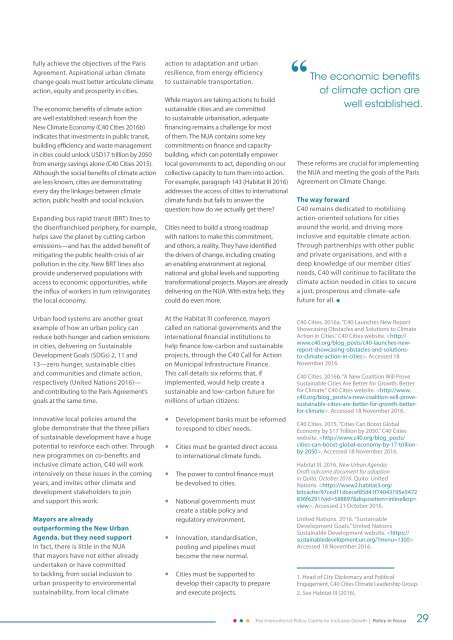A new urban paradigm pathways to sustainable development
PiF37
PiF37
You also want an ePaper? Increase the reach of your titles
YUMPU automatically turns print PDFs into web optimized ePapers that Google loves.
fully achieve the objectives of the Paris<br />
Agreement. Aspirational <strong>urban</strong> climate<br />
change goals must better articulate climate<br />
action, equity and prosperity in cities.<br />
The economic benefits of climate action<br />
are well established: research from the<br />
New Climate Economy (C40 Cities 2016b)<br />
indicates that investments in public transit,<br />
building efficiency and waste management<br />
in cities could unlock USD17 trillion by 2050<br />
from energy savings alone (C40 Cities 2015).<br />
Although the social benefits of climate action<br />
are less known, cities are demonstrating<br />
every day the linkages between climate<br />
action, public health and social inclusion.<br />
Expanding bus rapid transit (BRT) lines <strong>to</strong><br />
the disenfranchised periphery, for example,<br />
helps save the planet by cutting carbon<br />
emissions—and has the added benefit of<br />
mitigating the public health crisis of air<br />
pollution in the city. New BRT lines also<br />
provide underserved populations with<br />
access <strong>to</strong> economic opportunities, while<br />
the influx of workers in turn reinvigorates<br />
the local economy.<br />
action <strong>to</strong> adaptation and <strong>urban</strong><br />
resilience, from energy efficiency<br />
<strong>to</strong> <strong>sustainable</strong> transportation.<br />
While mayors are taking actions <strong>to</strong> build<br />
<strong>sustainable</strong> cities and are committed<br />
<strong>to</strong> <strong>sustainable</strong> <strong>urban</strong>isation, adequate<br />
financing remains a challenge for most<br />
of them. The NUA contains some key<br />
commitments on finance and capacitybuilding,<br />
which can potentially empower<br />
local governments <strong>to</strong> act, depending on our<br />
collective capacity <strong>to</strong> turn them in<strong>to</strong> action.<br />
For example, paragraph 143 (Habitat III 2016)<br />
addresses the access of cities <strong>to</strong> international<br />
climate funds but fails <strong>to</strong> answer the<br />
question: how do we actually get there?<br />
Cities need <strong>to</strong> build a strong roadmap<br />
with nations <strong>to</strong> make this commitment,<br />
and others, a reality. They have identified<br />
the drivers of change, including creating<br />
an enabling environment at regional,<br />
national and global levels and supporting<br />
transformational projects. Mayors are already<br />
delivering on the NUA. With extra help, they<br />
could do even more.<br />
“<br />
The<br />
economic benefits<br />
of climate action are<br />
well established.<br />
These reforms are crucial for implementing<br />
the NUA and meeting the goals of the Paris<br />
Agreement on Climate Change.<br />
The way forward<br />
C40 remains dedicated <strong>to</strong> mobilising<br />
action-oriented solutions for cities<br />
around the world, and driving more<br />
inclusive and equitable climate action.<br />
Through partnerships with other public<br />
and private organisations, and with a<br />
deep knowledge of our member cities’<br />
needs, C40 will continue <strong>to</strong> facilitate the<br />
climate action needed in cities <strong>to</strong> secure<br />
a just, prosperous and climate-safe<br />
future for all.<br />
Urban food systems are another great<br />
example of how an <strong>urban</strong> policy can<br />
reduce both hunger and carbon emissions<br />
in cities, delivering on Sustainable<br />
Development Goals (SDGs) 2, 11 and<br />
13—zero hunger, <strong>sustainable</strong> cities<br />
and communities and climate action,<br />
respectively (United Nations 2016)—<br />
and contributing <strong>to</strong> the Paris Agreement’s<br />
goals at the same time.<br />
Innovative local policies around the<br />
globe demonstrate that the three pillars<br />
of <strong>sustainable</strong> <strong>development</strong> have a huge<br />
potential <strong>to</strong> reinforce each other. Through<br />
<strong>new</strong> programmes on co-benefits and<br />
inclusive climate action, C40 will work<br />
intensively on these issues in the coming<br />
years, and invites other climate and<br />
<strong>development</strong> stakeholders <strong>to</strong> join<br />
and support this work.<br />
Mayors are already<br />
outperforming the New Urban<br />
Agenda, but they need support<br />
In fact, there is little in the NUA<br />
that mayors have not either already<br />
undertaken or have committed<br />
<strong>to</strong> tackling, from social inclusion <strong>to</strong><br />
<strong>urban</strong> prosperity <strong>to</strong> environmental<br />
sustainability, from local climate<br />
At the Habitat III conference, mayors<br />
called on national governments and the<br />
international financial institutions <strong>to</strong><br />
help finance low-carbon and <strong>sustainable</strong><br />
projects, through the C40 Call for Action<br />
on Municipal Infrastructure Finance.<br />
This call details six reforms that, if<br />
implemented, would help create a<br />
<strong>sustainable</strong> and low-carbon future for<br />
millions of <strong>urban</strong> citizens:<br />
• y Development banks must be reformed<br />
<strong>to</strong> respond <strong>to</strong> cities’ needs.<br />
• y Cities must be granted direct access<br />
<strong>to</strong> international climate funds.<br />
• y The power <strong>to</strong> control finance must<br />
be devolved <strong>to</strong> cities.<br />
• y National governments must<br />
create a stable policy and<br />
regula<strong>to</strong>ry environment.<br />
• y Innovation, standardisation,<br />
pooling and pipelines must<br />
become the <strong>new</strong> normal.<br />
• y Cities must be supported <strong>to</strong><br />
develop their capacity <strong>to</strong> prepare<br />
and execute projects.<br />
C40 Cities. 2016a. “C40 Launches New Report<br />
Showcasing Obstacles and Solutions <strong>to</strong> Climate<br />
Action in Cities.” C40 Cities website. .<br />
Accessed 18<br />
November 2016.<br />
C40 Cities. 2016b. “A New Coalition Will Prove<br />
Sustainable Cities Are Better for Growth, Better<br />
for Climate.” C40 Cities website. .<br />
Accessed 18 November 2016.<br />
C40 Cities. 2015. “Cities Can Boost Global<br />
Economy by $17 Trillion by 2050.” C40 Cities<br />
website. .<br />
Accessed 18 November 2016.<br />
Habitat III. 2016. New Urban Agenda:<br />
Draft outcome document for adoption<br />
in Qui<strong>to</strong>, Oc<strong>to</strong>ber 2016. Qui<strong>to</strong>: United<br />
Nations. . Accessed 21 Oc<strong>to</strong>ber 2016.<br />
United Nations. 2016. “Sustainable<br />
Development Goals.” United Nations<br />
Sustainable Development website. .<br />
Accessed 18 November 2016.<br />
1. Head of City Diplomacy and Political<br />
Engagement, C40 Cities Climate Leadership Group.<br />
2. See Habitat III (2016).<br />
The International Policy Centre for Inclusive Growth | Policy in Focus 29


